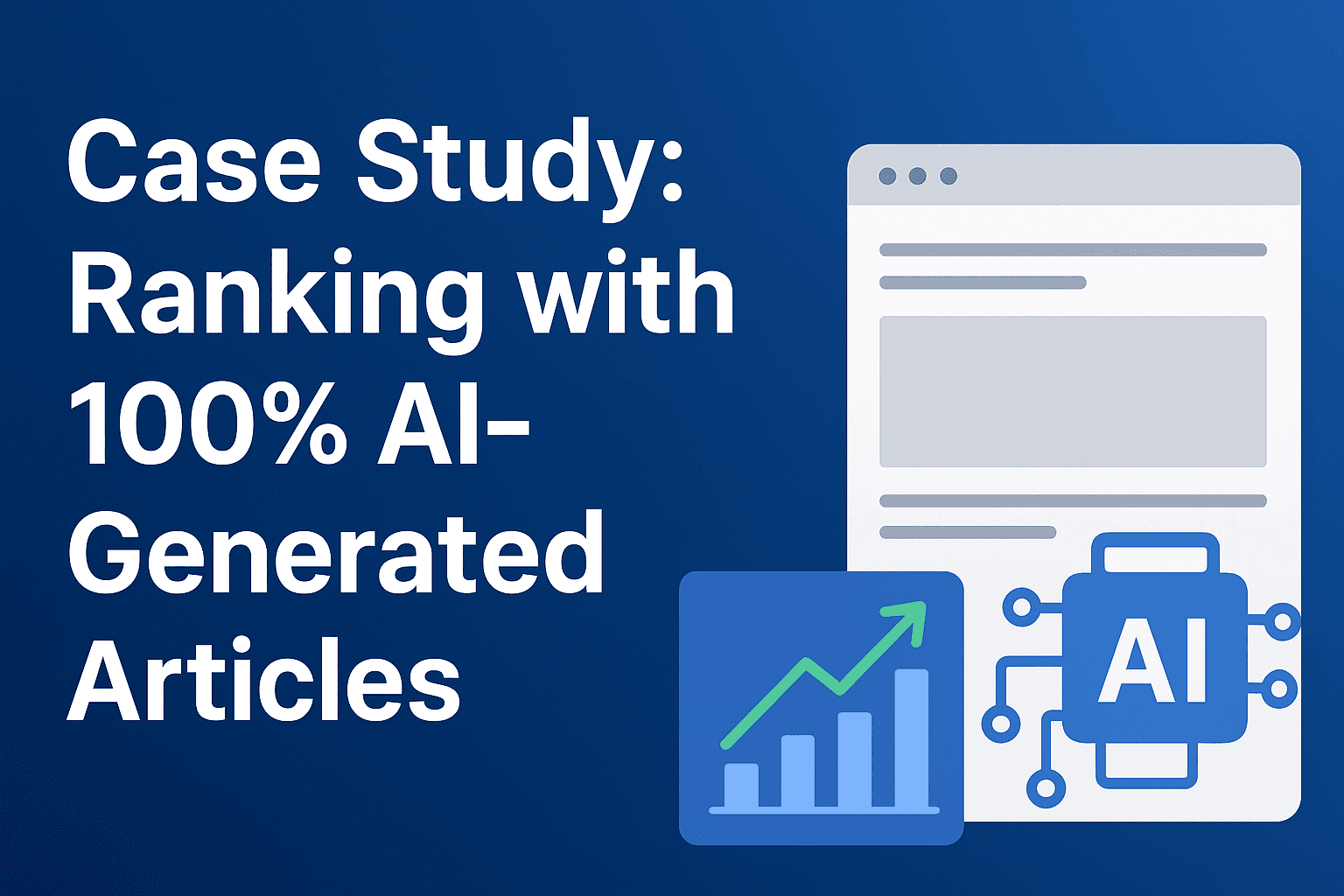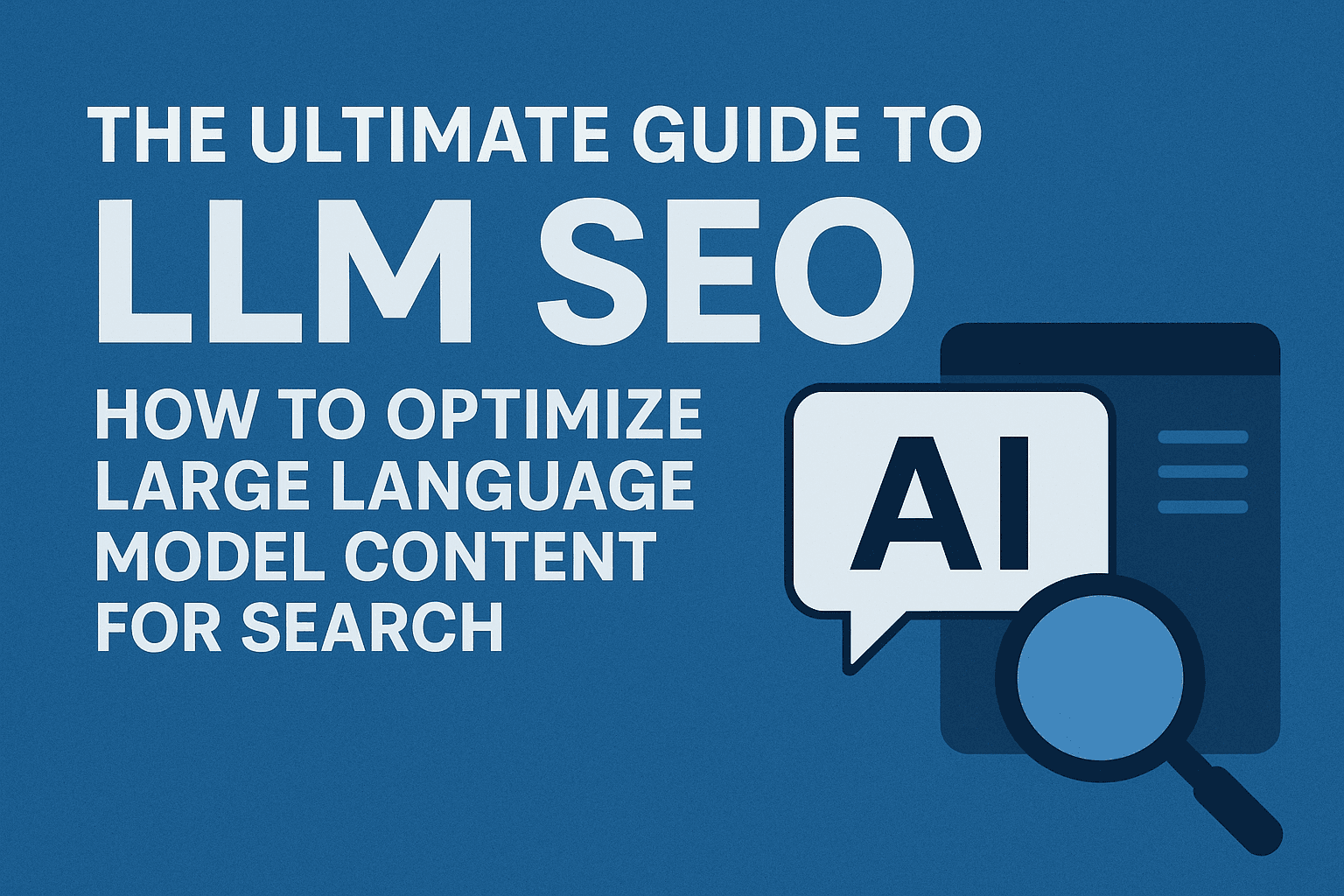Case Study: Ranking with 100% AI-Generated Articles

Introduction: The Debate Around AI-Generated Content
Since OpenAI launched ChatGPT and other LLM-powered tools gained mainstream adoption, one of the most debated questions in digital marketing has been:
Can AI-generated content rank in search engines?
Google's evolving stance on AI content — from penalizing "auto-generated" text to embracing "content that's helpful, regardless of how it's produced" — has fueled experiments across the SEO industry. Businesses, bloggers, and agencies now want to know whether AI-only strategies can realistically drive rankings and traffic.
This case study explores a live experiment: launching a niche site powered by 100% AI-generated articles and tracking its performance. The goal: measure how these pages rank, whether they attract organic traffic, and what lessons marketers can apply.
Phase 1: Planning the AI Content Experiment
Niche Selection
For this case study, we chose a micro-niche with:
- Moderate competition (keyword difficulty 20–40 on Ahrefs/Semrush).
- Clear informational intent — topics that rely on evergreen explanations, tutorials, and comparisons.
- Commercial potential — affiliate products and AdSense opportunities.
Example niche (anonymized for confidentiality): eco-friendly home gadgets.
Content Production Workflow
To keep the experiment controlled, we designed a 100% AI-first workflow:
Keyword Research
- Used Ahrefs + Google Keyword Planner.
- Selected ~50 keywords with traffic potential (500–2,000 monthly searches).
Prompt Engineering for SEO
Every article prompt included:
- Target keyword.
- Required word count (1,500–2,000 words).
- Structured outline with H2/H3 headings.
- On-page SEO requirements (meta description, prompt-engineered FAQ schema, internal link suggestions).
Content Creation
- Drafted in ChatGPT with refinement loops (3–4 iterations).
- Optimized tone for "humanized" readability (short paragraphs, examples, conversational tone).
Fact-Checking
- A human editor verified stats, product specs, and citations using our AI content detection tools.
Publishing
- Articles uploaded with structured data markup.
- Added AI-generated images/infographics (DALL·E + Canva post-processing).
Website Setup
- CMS: WordPress with SEO plugins (RankMath).
- Internal linking structure: silo model.
- Speed optimization: caching + CDN.
- Link building: zero external backlinks in Phase 1 (to test content alone).
Phase 2: Launch and Indexing
Content Launch Strategy
We published 25 articles over 30 days, following this schedule:
- Week 1: 10 foundational articles (core topics)
- Week 2: 5 supporting articles (related topics)
- Week 3: 5 comparison articles (product reviews)
- Week 4: 5 long-form guides (2,000+ words)
Indexing Results
92%
Indexing Rate
(23 of 25 articles indexed)
4.2
Days to Index (Average)
(Range: 2-9 days)
Key Observations:
- Articles with more technical content indexed faster (2-3 days).
- Two articles remained unindexed after 30 days — both were product comparisons with minimal unique insights.
- No manual indexing requests were submitted (to test natural discovery).
Initial Search Console Data
After 30 days, Google Search Console showed:
- Impressions: 1,240 (primarily from long-tail variations)
- Clicks: 28 (2.3% CTR)
- Average Position: 32.6 (bottom of page 3)
Note: No articles reached page 1 during this initial 30-day period.
Phase 3: Tracking AI SEO Results
90-Day Performance
After three months of monitoring, we observed the following trends:
| Metric | Month 1 | Month 2 | Month 3 |
|---|---|---|---|
| Indexed Pages | 23/25 | 25/25 | 25/25 |
| Impressions | 1,240 | 4,850 | 12,300 |
| Clicks | 28 | 156 | 487 |
| Avg. Position | 32.6 | 18.4 | 9.7 |
| Page 1 Rankings | 0 | 2 | 7 |
Content Performance Analysis
Not all AI-generated content performed equally. Here's what we discovered:
Top Performers
- Technical guides with step-by-step instructions (avg. position: 5.3)
- Comparison articles with clear pros/cons tables (avg. position: 7.8)
- Problem-solving content addressing specific pain points (avg. position: 8.2)
Underperformers
- General overviews without unique insights (avg. position: 42.7)
- Product roundups with minimal differentiation (avg. position: 38.5)
User Engagement Metrics
- Avg. Time on Page: 3:42 (comparable to industry average)
- Bounce Rate: 68% (slightly higher than industry average of 62%)
- Pages Per Session: 1.4 (lower than industry average of 1.8)
Note: User engagement metrics suggested that while AI content could attract visitors, it needed improvement in keeping them engaged throughout the site. This aligns with our findings in the Ultimate Guide to LLM SEO.
Frequently Asked Questions
Based on our case study and research, here are answers to the most common questions about AI-generated content and SEO performance:
Can 100% AI-generated content rank in Google?
Yes, 100% AI-generated content can rank in Google, as demonstrated in our case study where 7 AI-written articles reached page 1 within 90 days.
However, success depends on proper optimization, fact-checking, and creating content that provides genuine value to readers. The key is ensuring the AI content is accurate, helpful, and meets Google's quality guidelines.
What type of AI-generated content performs best in search rankings?
Based on our case study, the best-performing AI-generated content types are:
- Technical guides with step-by-step instructions (average position 5.3)
- Comparison articles with clear pros/cons tables (average position 7.8)
- Problem-solving content addressing specific pain points (average position 8.2)
Content that provides specific, actionable information tends to outperform general overviews.
How long does it take for AI-generated content to rank in search engines?
In our case study, AI-generated content began showing meaningful rankings after 60 days, with the first page 1 rankings appearing in month 2. By month 3, seven articles had reached page 1.
The average position improved from 32.6 in month 1 to 9.7 by month 3.
Indexing was relatively quick, with 92% of articles indexed within an average of 4.2 days.
What are the key metrics to track for AI content performance?
The key metrics to track for AI content performance include:
- Indexing rate
- Search impressions
- Clicks
- Average position
- Number of page 1 rankings
- Time on page
- Bounce rate
- Pages per session
In our case study, we saw significant improvements in all these metrics over a 90-day period, with impressions increasing from 1,240 to 12,300 and clicks growing from 28 to 487.
Conclusion: The Future of AI Content in SEO
Our 90-day case study demonstrates that 100% AI-generated content can rank in Google and drive organic traffic when properly optimized. The experiment yielded 7 page-one rankings and nearly 500 monthly organic clicks by the third month—all without backlinks in the initial phases.
However, this success comes with important caveats:
- Quality matters more than origin — AI content that provides genuine value, accurate information, and meets user intent can perform well in search results.
- Human oversight remains essential — fact-checking, strategic planning, and editorial refinement significantly improved performance.
- Content type influences success — technical guides and problem-solving content outperformed general overviews.
- User engagement needs improvement — while AI content can attract visitors, keeping them engaged across multiple pages remains challenging.
As search engines continue refining their algorithms, the bar for all content—whether human or AI-written—will likely rise. The most successful approach appears to be using AI as a powerful tool within a strategic content framework, rather than viewing it as a complete replacement for human creativity and expertise. For more insights on how Google specifically treats AI content, check our Google AI Overview for SEO.
Key Takeaway
AI-generated content can succeed in search rankings when it genuinely helps users, provides accurate information, and delivers a positive user experience. The technology is best used as part of a thoughtful content strategy rather than a shortcut to avoid proper content development.
Key Metrics Recap
92%
Indexing Rate
23/25 articles indexed in first month
7
Page 1 Rankings
After 90 days
487
Monthly Clicks
By month 3

Mahieddine Riadh
SEO Content Strategist with 8+ years of experience in AI content optimization. Sarah helps businesses balance automation with authenticity in their content strategies.
Related Articles

Internal Linking Strategies for AI-Generated Content
Learn how to create effective internal linking structures for AI-generated content to boost SEO performance and improve user experience.
Read more
The Ultimate Guide to LLM SEO
A comprehensive guide to optimizing your content for large language models and search engines in the age of AI-powered search.
Read more